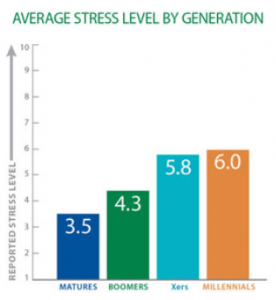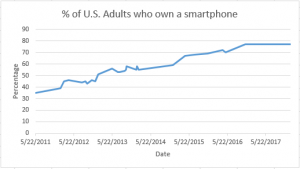
Figure 1. Participants rate their stress level on a scale of 1-10, where 1 equals “little or no stress” and 10 means you have “a great deal of stress”. Photo source: American Psychological Association
Although stress usually has a bad connotation associated with it, there is also positive stress. For example, positive stress can motivate you and help you complete tasks more efficiently. However, high levels of stress can lead to anxiety, depression, high blood pressure, and other chronic illnesses. Stress levels found in humans have increased drastically over the years and may be a concern to a high percentage of the human population. There are many factors that can explain the increase in stress over the generations, but let’s focus on one that we are all familiar with: technology.
Could the increase in stress over the years be linked to technology use?
Let’s first look at smartphone ownership over the recent years. In 1992, the first smartphone, the Simon Personal Communicator by IBM, was introduced and 15 years later, the first iphone was produced. The popularity did not start immediately and only began increasing around 2011, where approximately 35% of U.S. adults owned a smartphone. The percentage quickly ascended over the next 6 years to 77%. With more advances in technology, people are now overly dependent on their smartphones. But, who can blame us for being overly dependent on our smartphones? Not only can it take high quality videos/photos, but you can even pay with smartphones nowadays – it’s all just one tap away.

Figure 1. Smartphone Ownership Adapted from: Pew Research Center – Internet & Technology
So, what evidence is there that proves that technology adds stress to our lives? Well, sleeping patterns can be easily affected by technology, one second you’re getting ready for bed, and the next second you are asking your friends whether the dress is black and blue, or white and gold and then you realize it’s way past your bedtime. The constant distractions our smartphones present make us less efficient when completing tasks as simple as going to bed at an appropriate time.
:max_bytes(150000):strip_icc()/GettyImages-rbrb_2118-58cd9bbb5f9b581d72c1cb24.jpg)
Photo source: Lifewire
Furthermore, the blue light emitted from our phone screens can reduce melatonin production, which reduces your sleep quality. When sleep quality is reduced, one then becomes less resilient and stress levels and anxiety increase.
In conclusion, it is evident that the accessibility and convenience of technology can negatively affect our living qualities by causing stress levels to rise. As stated above, sleep is easily affected by technology use and sleep is crucial for out bodies to function properly. Therefore, although technology can be very handy, one should be aware of the effects of technology on your stress levels.
Watch the following video for more information on the effects of technology:

3 responses to “The Link Between Stress and Technology”